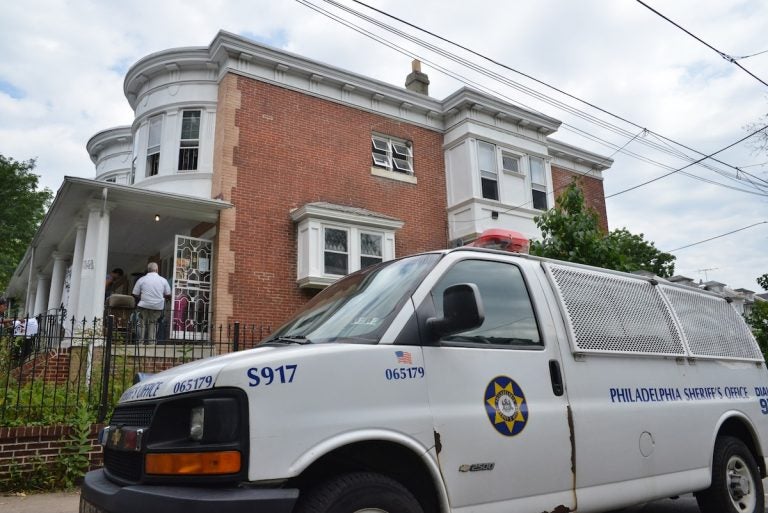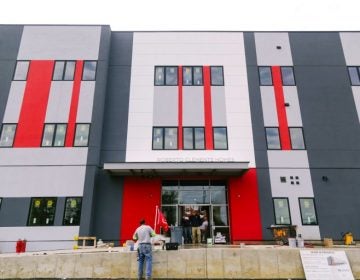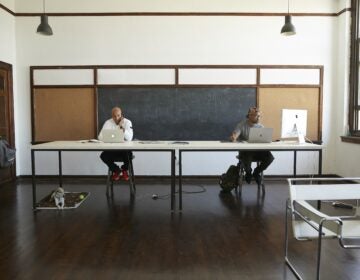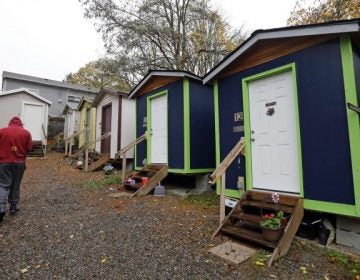Mayor Kenney’s budget would gut Philly’s best defense against a brewing eviction crisis
A surge of evictions is expected this summer when city courts reopen and a proposed budget cut threatens to worsen the crisis, writes a retired Philadelphia judge.

The Philadelphia Sheriff enforces an eviction order. (WHYY)
COVID-19 has created a national emergency. With its high poverty rate, Philadelphia is being hit hard — by the virus itself and by the devastating economic consequences.
The City of Philadelphia has made great strides in providing food for people in need and strengthening protections for workers, both essential for weathering this crisis. But there is another crisis in Philadelphia, one that already existed before COVID-19 and that has only gotten worse: eviction.
The good news is that Philadelphia already has a solution in place, the Philadelphia Eviction Prevention Project (PEPP). PEPP was created by the mayor and Philadelphia City Council in 2017, with funding from the City of Philadelphia and strong support from the Philadelphia Bar Association. This year, a consortium of six legal aid providers and non-profits received $2.1 million for critical eviction prevention work.
But Mayor Jim Kenney’s new budget proposes only $500,000 – gutting legal representation of and support for tenants facing eviction in the midst of a pandemic.
Philadelphia Courts are now closed, and no one can legally be evicted in Philadelphia. But housing advocates say there are approximately 1,700 eviction court hearings that may need to be rescheduled when the court reopens. That 1,700 comes on top of the monthly average of 1,500 eviction hearings that happen in city courts.
There were hundreds of judgments entered in the 60 days before the court closed and lockouts will likely proceed immediately once the court opens back up, possibly with no further notice to the tenant. Unless our systems are prepared, once the courts reopen, thousands of Philadelphians will lose their homes due to eviction and many may become homeless.
This is a dire public health issue. If we see a huge wave of evictions this summer, it will increase homelessness, overwhelm the shelter system, and force people to live in overcrowded dwellings with family and friends, potentially spreading infection and causing a resurgence in infections and a likely second shutdown.
Some of the lockouts may well be illegal. A significant portion of Philadelphia’s rental housing stock has severe habitability issues from mold, to pests, to lead. There are renters, including vulnerable seniors and mothers of young children, who may not be aware of their legal rights to stay in homes.
It is clear that what is needed is an emergency crisis response.
City Council created PEPP two years ago for tenants facing eviction, because Philadelphia recognized that not only does poverty cause evictions, but evictions also cause prolonged poverty. PEPP is a collaboration of six agencies that provides legal representation in eviction cases, an in-court help center, a tenant helpline, and community outreach (including a comprehensive website at phillytenant.org) to assist tenants and prevent homelessness and displacement.
PEPP has already been enormously successful in using best practices to prevent homelessness and eviction. And throughout the COVID-19 crisis, it has been more important than ever.
Because of the city’s investment in PEPP, PEPP advocates were able to immediately respond to the COVID-19 crisis by advocating for the courts to close and for a moratorium on eviction lockouts, ensuring that tenants were not rendered homeless or otherwise displaced during the shelter-in-place order.
PEPP advocates have kept the hotline going by working remotely, responding to tenants, advising on working out payment agreements with landlords and ensuring emergency repairs. These advocates have seamlessly moved community education and outreach online and put together vital informational flyers to alert tenants to their rights and available resources. In juxtaposition to other areas of the state and country who do not have the same level of coordinated representation and advocacy for tenants, Philadelphia’s tenants have thus far been able to maintain stable housing.
These are vital, life-saving services for renters but they also benefit us all. A recent report commissioned by the Philadelphia Bar Association determined that for every $1 invested in legal representation for renters, the City sees an economic return of $12. This is because legal aid programs prevent eviction-related shelter, medical, and social service costs and expenses. At a time when our economy is taking a huge hit, this economic return on investment is absolutely essential.
The mayor’s budget should include stable funding for this program in the coming year. This investment in PEPP will be crucial for continued stability in the coming year. Rental assistance will hopefully be available to help some tenants, but the majority of tenants who are facing overwhelming economic hardship will still need PEPP’s services to avoid disruptive displacement. Now, more than ever, PEPP will provide much-needed information, legal representation, and court advocacy to stabilize Philadelphia’s renters.
By continuing to fund PEPP and other legal aid efforts, the City can support renters, prevent homelessness and displacement, and help our entire community weather this storm.
By Philadelphia Bar Association Chancellor Hon. A. Michael Snyder (ret.) and Joseph A. Sullivan and Catherine Carr, co-chairs of the Association’s Civil Gideon and Access to Justice Task Force.
 WHYY is one of over 20 news organizations producing Broke in Philly, a collaborative reporting project on solutions to poverty and the city’s push towards economic justice. Follow us at @BrokeInPhilly.
WHYY is one of over 20 news organizations producing Broke in Philly, a collaborative reporting project on solutions to poverty and the city’s push towards economic justice. Follow us at @BrokeInPhilly.
WHYY is your source for fact-based, in-depth journalism and information. As a nonprofit organization, we rely on financial support from readers like you. Please give today.







![CoronavirusPandemic_1024x512[1]](https://whyy.org/wp-content/uploads/2020/03/CoronavirusPandemic_1024x5121-300x150.jpg)

